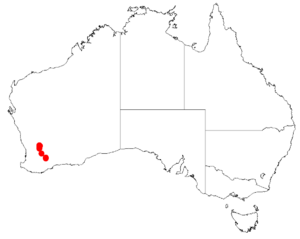Acacia caesariata facts for kids
Quick facts for kids Acacia caesariata |
|
|---|---|
| Conservation status | |
| Scientific classification | |
| Genus: |
Acacia
|
| Species: |
caesariata
|
 |
|
| Occurrence data from AVH | |
The Acacia caesariata is a type of shrub, which is a bushy plant. It belongs to the large group of plants called Acacia, also known as wattles. This particular wattle is found naturally in the Wheatbelt area of Western Australia.
About the Acacia Caesariata Plant
This wattle is a dense, round-shaped bush. It usually grows to be about 0.6 to 1.6 metres (2.0 to 5.2 ft) tall. Its small branches are a bit bumpy and have tiny hairs. It also has small, leaf-like parts called stipules that stay on the stem and are about 1.5 to 4 mm (0.059 to 0.157 in) long.
Like many Acacia species, this plant doesn't have regular leaves. Instead, it has special leaf-like parts called phyllodes. These phyllodes are tough and dull green to grey-green in color. They stand up straight or are slightly curved. Their shape is like a spear, wider at the top and narrower at the bottom. Each phyllode is about 2 to 4.5 cm (0.79 to 1.77 in) long and 2 to 10 mm (0.079 to 0.394 in) wide. They have three to five or more main veins running lengthwise.
The Acacia caesariata blooms, or flowers, from August to September. When it blooms, it produces pretty yellow flowers.
Where the Acacia Caesariata Lives
This plant is found in different, separate areas. You can find it from around Kununoppin in the north down to Lake Grace in the south.
It likes to grow in sandy clay and rich dirt. It is often found in areas with Eucalyptus trees, which are also known as gum trees, and in low, bushy areas called mallee scrub communities.
Images for kids



